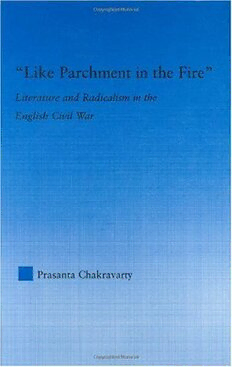
'Like Parchment in the Fire': Literature and Radicalism in the English Civil War (Literary Criticism and Cultural Theory) PDF
224 Pages·2006·1.118 MB·English
Most books are stored in the elastic cloud where traffic is expensive. For this reason, we have a limit on daily download.
Preview 'Like Parchment in the Fire': Literature and Radicalism in the English Civil War (Literary Criticism and Cultural Theory)
Description:
Prasanta Chakravarty appraises the very nature of what constitutes liberalism, both conceptually and historically, by studying early modern English sectarian literature and activities. Competing claims of stability or radicalism were being made in seventeenth-century England by preachers, political thinkers and the layperson. Consequently, in the literary and political writings of the period, there is often a thin line that separates the radical from the reactionary. This book examines the literary, religious and political aspects of the radical movements and sects - the Republicans, the Levellers, the Diggers and the Ranters - and examines their claims of radicalism within the framework of liberalism. Featuring a chapter on John Milton, the book also addresses the legal problems that engaged the early modern radical reformers, the issue of radical religion as a negotiating tool and the limits of radical liberal thought. One outstanding feature of the book is its evaluation of political literature from a radical liberal point of view - such a thing has not yet been attempted in post-revisionist early modern scholarship. Prasanta Chakravarty's work considerably broadens the scope of what constitutes seventeenth-century British Literature, making it a must-read for students of literature.
See more
The list of books you might like
Most books are stored in the elastic cloud where traffic is expensive. For this reason, we have a limit on daily download.
